BIM Birlesik Magazalar Bundle
How Did BIM Birlesik Magazalar Conquer the Turkish Retail Market?
Ever wondered how a discount supermarket chain became a retail powerhouse? This is the story of BIM Birlesik Magazalar, a company that transformed the Turkish retail landscape. From its inception in 1995, BIM set out to redefine grocery shopping with a focus on affordability and efficiency. Discover the key moments that shaped BIM Birlesik Magazalar SWOT Analysis and its journey to becoming a leading retailer.
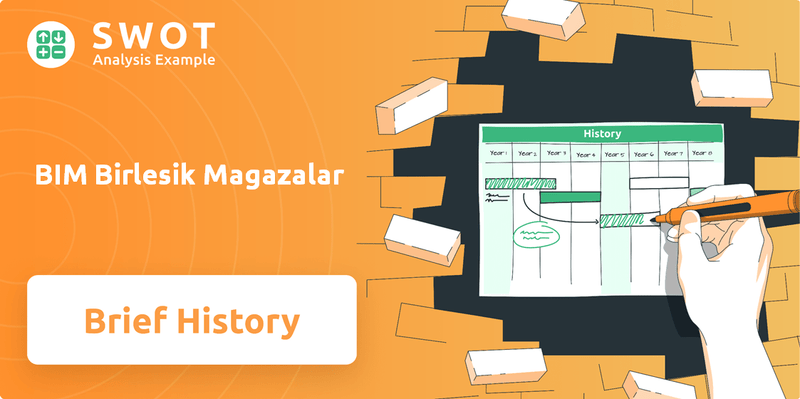
The brief history of BIM Birlesik Magazalar reveals a compelling narrative of strategic innovation and market adaptation. BIM's early years saw it embrace a discount store model, a novel approach in Turkey that resonated with consumers seeking value. Its expansion, both within Turkey and internationally, highlights a keen understanding of market dynamics and consumer needs, solidifying its position in the Turkish retail sector and beyond. Today, BIM's success story offers valuable lessons in business strategy and market leadership.
What is the BIM Birlesik Magazalar Founding Story?
The founding of BIM Birlesik Magazalar marks a pivotal moment in the BIM history, reshaping the Turkish retail landscape. Established on May 29, 1995, the company emerged to fill a crucial gap in the market, focusing on providing affordable daily necessities to a broad consumer base. This strategic move set the stage for its rapid growth and enduring impact on the Turkish economy.
The visionaries behind BIM, including Cuneyt Zapsu, recognized the need for a discount supermarket model in Turkey. This approach, new to the Turkish market, was designed to offer essential goods at competitive prices. The founders, drawing from various business backgrounds, aimed to implement a highly efficient, limited-assortment strategy. This model prioritized value and accessibility, addressing the needs of a large segment of the population seeking affordable options.
The initial business model of BIM Birlesik Magazalar centered on offering a carefully selected range of fast-moving consumer goods (FMCG) at significantly lower prices than traditional supermarkets. This was achieved through several key strategies. These included bulk purchasing, direct sourcing from manufacturers, and a lean operational structure that minimized overhead costs. The first 'product' was essentially the entire limited assortment of essential food and household items offered within a small, standardized store format.
BIM Birlesik Magazalar started with a clear focus on affordability and efficiency.
- The initial funding came from the founders and their networks, reflecting a lean startup approach.
- The name 'BIM,' originally 'Birlesik Isciler Magazalari' (United Workers' Stores), reflected its initial focus on serving the working class.
- The company's rapid acceptance in the market was significantly influenced by a growing urban population seeking value for money.
- The early years of BIM were marked by a commitment to providing essential goods at accessible prices.
BIM Birlesik Magazalar SWOT Analysis
- Complete SWOT Breakdown
- Fully Customizable
- Editable in Excel & Word
- Professional Formatting
- Investor-Ready Format
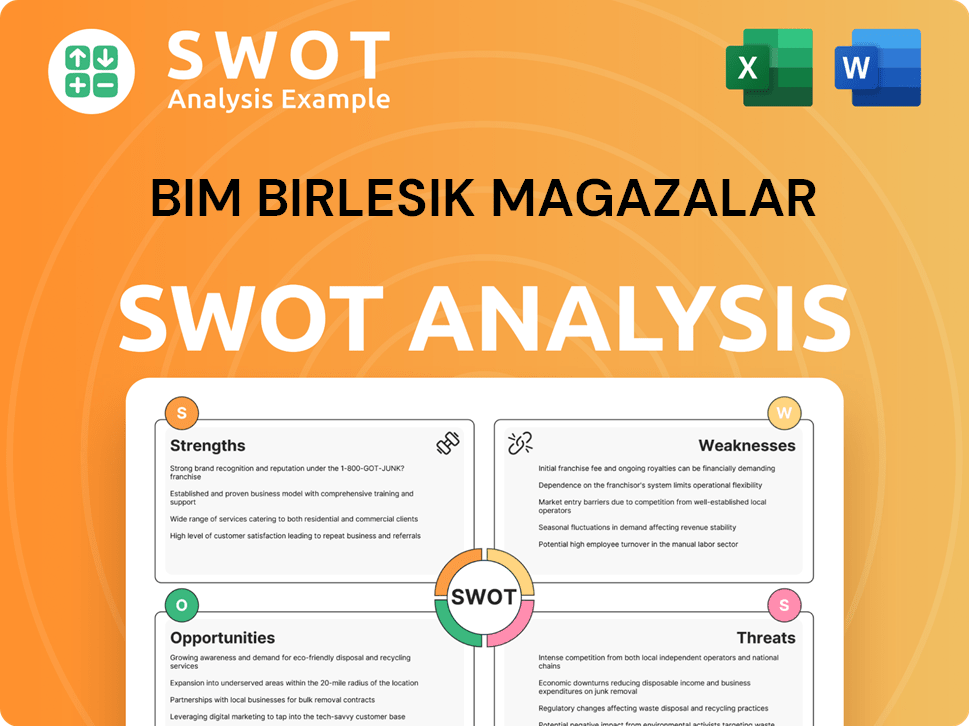
What Drove the Early Growth of BIM Birlesik Magazalar?
The early growth of BIM Birlesik Magazalar was marked by a rapid and disciplined expansion strategy. This phase focused on opening numerous small, standardized stores across Turkey. The company initially established its presence in key urban centers, using its low-cost model to attract a broad customer base. Early product launches prioritized refining its limited assortment, ensuring essential goods were always available at competitive prices.
BIM's expansion involved opening many stores quickly. The focus was on a standardized format to maintain efficiency. This strategy helped BIM establish a strong presence in the Turkish retail market.
Instead of introducing new items, BIM concentrated on refining its existing product range. This approach ensured that essential goods were always in stock and affordable. The strategy helped build customer loyalty.
Early sales success was driven by high transaction volumes and increased foot traffic. The growing number of stores across Turkey contributed to this growth. This demonstrated the effectiveness of BIM's discount model.
Team expansion focused on efficient store management and a lean corporate structure. Initial office locations were modest, reflecting a commitment to minimizing overhead. This helped BIM maintain its competitive pricing.
BIM Birlesik Magazalar PESTLE Analysis
- Covers All 6 PESTLE Categories
- No Research Needed – Save Hours of Work
- Built by Experts, Trusted by Consultants
- Instant Download, Ready to Use
- 100% Editable, Fully Customizable
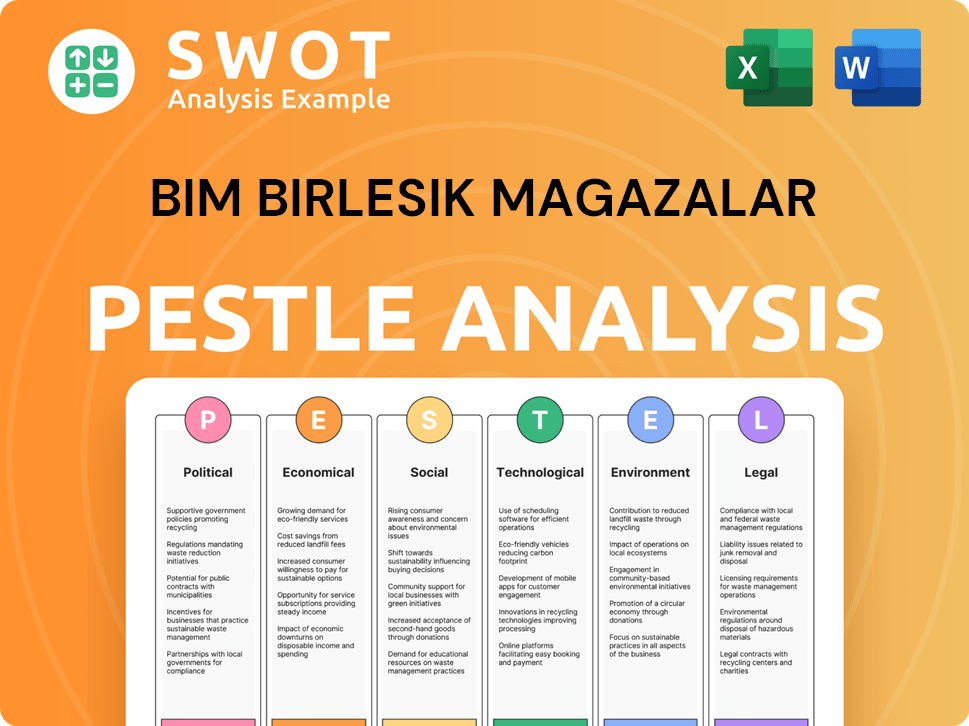
What are the key Milestones in BIM Birlesik Magazalar history?
The BIM Birlesik Magazalar journey, a significant player in Turkish retail, has been marked by key milestones, strategic innovations, and the navigation of various challenges. The BIM company's history reflects its adaptation to the dynamic market conditions and its commitment to providing value to its customers.
| Year | Milestone |
|---|---|
| 1995 | BIM Birlesik Magazalar was founded, marking the beginning of its journey in the Turkish retail sector. |
| Early 2000s | BIM expanded its store network rapidly, establishing a strong presence across Turkey. |
| 2010s | BIM started its international expansion, extending its operations to Morocco and Egypt. |
| 2024 | BIM had over 12,000 stores across Turkey, Morocco, and Egypt. |
BIM's innovation lies in its 'hard discount' model, a pioneering approach in the Turkish market. This model focuses on a limited product range, efficient supply chain management, and minimal overhead costs.
BIM's core innovation is the hard discount model, which prioritizes a limited product assortment and cost efficiency.
The company has focused on efficient supply chain management to reduce costs and maintain product availability.
BIM has developed a strong portfolio of private-label products, offering competitive prices and controlling product quality.
Rapid store expansion, reaching over 12,000 stores by 2024, has been a key element of its growth strategy.
BIM consistently focuses on optimizing its operational efficiency to maintain a low-cost structure.
Building long-term relationships with suppliers ensures consistent product quality and competitive pricing.
BIM has faced challenges from competitors emulating its success and economic fluctuations impacting purchasing power. Economic downturns and currency fluctuations have also posed significant hurdles for the company.
Intense competition from both local and international retailers has been a constant challenge for BIM in the Turkish retail market.
Economic downturns in Turkey and other operating regions have impacted consumer purchasing power and supply chain costs.
Currency fluctuations have affected supply chain costs, requiring BIM to adapt its pricing and sourcing strategies.
BIM must remain agile in adapting to changing consumer demands and market conditions to maintain its competitive edge.
The company's ability to maintain a low-cost structure, even amidst inflationary pressures, is critical for its success.
A strong private label portfolio helps BIM mitigate price volatility and provide value to consumers.
BIM Birlesik Magazalar Business Model Canvas
- Complete 9-Block Business Model Canvas
- Effortlessly Communicate Your Business Strategy
- Investor-Ready BMC Format
- 100% Editable and Customizable
- Clear and Structured Layout
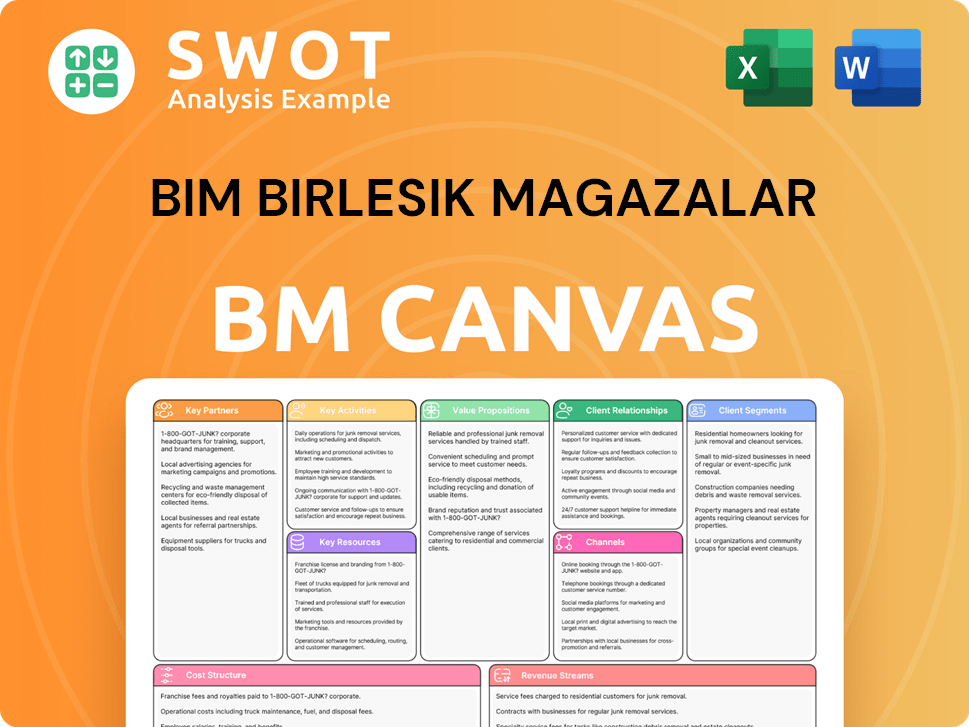
What is the Timeline of Key Events for BIM Birlesik Magazalar?
The Growth Strategy of BIM Birlesik Magazalar, a key player in the Turkish retail sector, has a rich history marked by strategic expansions and adaptations. Founded in Istanbul, Turkey, the company has grown from its inception in 1995 to become a dominant force in discount stores, both domestically and internationally.
| Year | Key Event |
|---|---|
| 1995 | Founding of BIM Birlesik Magazalar in Istanbul, Turkey, marked the beginning of its journey. |
| 1997 | Rapid expansion began, establishing a strong presence in major Turkish cities. |
| 2001 | Introduction of private label products, a key strategy for cost control and differentiation. |
| 2005 | Initial Public Offering (IPO) on the Istanbul Stock Exchange, providing capital for further expansion. |
| 2009 | Entry into the international market with the opening of stores in Morocco. |
| 2013 | Expansion into Egypt, further solidifying its international footprint. |
| 2018 | Reaches over 7,000 stores in Turkey, demonstrating significant domestic growth. |
| 2020 | Navigates the challenges of the global pandemic, reinforcing its essential service role. |
| 2023 | Continues robust growth, with a reported 12,246 stores in Turkey and 1,265 stores in Morocco and Egypt as of the end of 2023. |
| 22 February 2024 | Recognized for its strong financial performance and dividend yield. |
| April 2025 | Continues to be a dominant force in the discount retail sector, with ongoing expansion plans and a focus on operational efficiency. |
BIM's future is focused on continued organic growth, both domestically and internationally. The company aims to further penetrate existing markets. Strategic initiatives include enhancing private label offerings and optimizing the supply chain.
Key strategies include enhancing private label offerings and optimizing its supply chain with advanced logistics. The company is also leveraging technology to improve operational efficiency and customer experience. These initiatives are crucial for maintaining its competitive edge.
Industry trends such as increasing demand for value, the rise of e-commerce, and sustainability concerns are likely to impact BIM. While primarily a brick-and-mortar retailer, the company may explore selective digital initiatives. This will help them adapt to changing consumer behavior.
Analyst predictions generally remain positive, citing BIM's resilient business model and strong market position. Leadership statements emphasize a continued commitment to its core values of providing affordable, quality products. This approach is consistent with its founding vision.
BIM Birlesik Magazalar Porter's Five Forces Analysis
- Covers All 5 Competitive Forces in Detail
- Structured for Consultants, Students, and Founders
- 100% Editable in Microsoft Word & Excel
- Instant Digital Download – Use Immediately
- Compatible with Mac & PC – Fully Unlocked
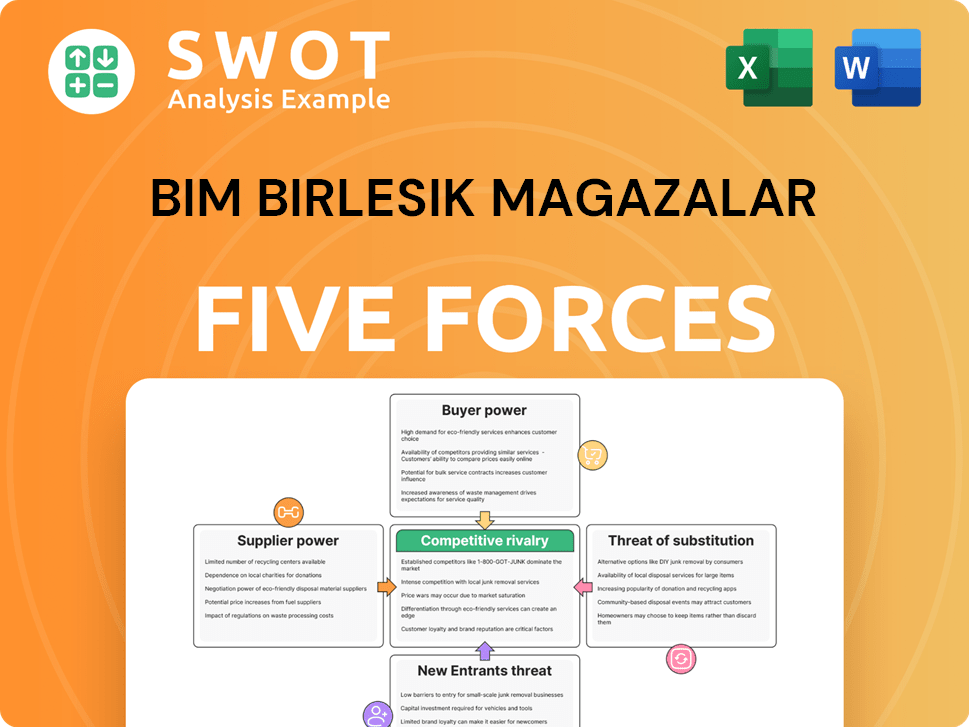
Related Blogs
- What is Competitive Landscape of BIM Birlesik Magazalar Company?
- What is Growth Strategy and Future Prospects of BIM Birlesik Magazalar Company?
- How Does BIM Birlesik Magazalar Company Work?
- What is Sales and Marketing Strategy of BIM Birlesik Magazalar Company?
- What is Brief History of BIM Birlesik Magazalar Company?
- Who Owns BIM Birlesik Magazalar Company?
- What is Customer Demographics and Target Market of BIM Birlesik Magazalar Company?
Disclaimer
All information, articles, and product details provided on this website are for general informational and educational purposes only. We do not claim any ownership over, nor do we intend to infringe upon, any trademarks, copyrights, logos, brand names, or other intellectual property mentioned or depicted on this site. Such intellectual property remains the property of its respective owners, and any references here are made solely for identification or informational purposes, without implying any affiliation, endorsement, or partnership.
We make no representations or warranties, express or implied, regarding the accuracy, completeness, or suitability of any content or products presented. Nothing on this website should be construed as legal, tax, investment, financial, medical, or other professional advice. In addition, no part of this site—including articles or product references—constitutes a solicitation, recommendation, endorsement, advertisement, or offer to buy or sell any securities, franchises, or other financial instruments, particularly in jurisdictions where such activity would be unlawful.
All content is of a general nature and may not address the specific circumstances of any individual or entity. It is not a substitute for professional advice or services. Any actions you take based on the information provided here are strictly at your own risk. You accept full responsibility for any decisions or outcomes arising from your use of this website and agree to release us from any liability in connection with your use of, or reliance upon, the content or products found herein.